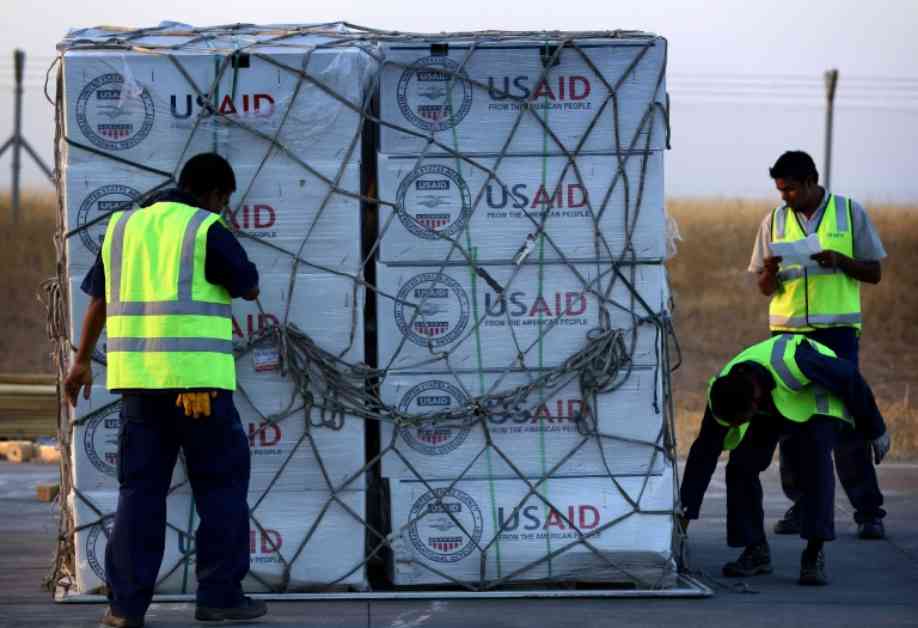Elon Musk, with the backing of President Donald Trump, has initiated drastic measures aimed at shutting down the U.S. Agency for International Development (USAID), sparking a storm of controversy and chaos within the political sphere. While the agency has not been officially dissolved, its headquarters have been shuttered, employees locked out of key systems, and funding put on hold as part of a sweeping review.
USAID, a cornerstone of U.S. foreign aid and development efforts, managed a staggering £32 billion ($40 billion) in humanitarian assistance across 130 countries in 2023. From disaster relief to democracy-building projects, the agency has played a crucial role in global aid efforts. However, critics such as Musk and Trump have raised concerns about mismanagement, alleging wasteful spending and political bias within the organization.
Amidst mounting pressure, USAID employees received a jolting email on February 3, announcing the closure of their Washington headquarters and leaving 600 staff members locked out of critical internal systems overnight. President Trump, a vocal critic of the agency, lambasted USAID as being controlled by ‘radical lunatics’ and in need of a complete overhaul. Despite these declarations, no formal executive order has been issued to dismantle the agency entirely, leaving its future in limbo.
Controversial Spending and LGBTQ Initiatives
A major point of contention surrounding USAID’s operations has been its allocation of taxpayer funds towards controversial initiatives, particularly those supporting LGBTQ programs abroad. Reports from Daily Mail highlighted millions of dollars directed towards various LGBTQ projects globally, drawing ire from conservative lawmakers.
For instance, USAID granted £1.2 million ($1.5 million) to a Serbian NGO, ‘Grupa Izadji’ (‘Group Come Out’), to promote LGBTQ workplace inclusion and economic opportunities. Additionally, nearly £23 million ($30 million) was channeled into research on HIV transmission among transgender individuals and sex workers in South Africa. The agency also reportedly funded transgender healthcare endeavors in Vietnam and India, along with a £20,000 ($25,000) opera in Colombia aimed at advancing transgender representation in the arts.
While these initiatives were defended as part of USAID’s broader human rights agenda, critics argued that they strayed from the agency’s primary mission of providing direct humanitarian relief.
Political Fallout and Legal Uncertainty
The decision to freeze USAID’s operations has ignited a firestorm of opposition from Democratic lawmakers and international allies alike. Senator Chris Van Hollen decried the move as ‘plain illegal,’ contending that the President lacks the unilateral authority to dismantle an agency established by Congress. In a show of defiance, Democratic legislators staged a protest outside USAID headquarters, vowing to challenge the shutdown through legal means, as reported by New York Post.
Secretary of State Marco Rubio has been tapped as the interim administrator of USAID, hinting at a potential absorption of the agency into the State Department rather than complete dissolution. Rubio emphasized that USAID’s future remains uncertain but assured that its operations would be restructured to better align with U.S. national interests.
As the dust settles, the fate of USAID hangs in the balance. Despite Musk’s assertion that the agency is ‘beyond repair’ and Trump’s tacit support for its closure, USAID’s complete shutdown is by no means a foregone conclusion. Politico reported that the agency’s digital footprint has been erased, its physical offices stripped of branding, and its employees left in a state of uncertainty. However, legal battles and political maneuvering will ultimately dictate the agency’s future trajectory.
For now, USAID stands at a crossroads, with its destiny poised between potential dissolution, restructuring, or reinstatement. The tug-of-war between legal challenges and political machinations sets the stage for a contentious battle over the agency’s future path.













